Fleurs du Mal Magazine


A daughter’s struggle to keep her family alive, through poverty, homelessness and incarceration
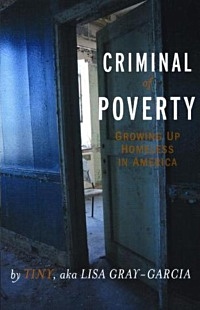 Eleven-year-old Lisa becomes her mother’s primary support when they face the prospect of homelessness. As Dee, a single mother, struggles with the demons of her own childhood of neglect and abuse, Lisa has to quickly assume the roles of an adult in an attempt to keep some stability in their lives.
Eleven-year-old Lisa becomes her mother’s primary support when they face the prospect of homelessness. As Dee, a single mother, struggles with the demons of her own childhood of neglect and abuse, Lisa has to quickly assume the roles of an adult in an attempt to keep some stability in their lives.
“Dee and Tiny” ultimately become underground celebrities in San Francisco, squatting in storefronts and performing the “art of homelessness.” Their story, filled with black humor and incisive analysis, illuminates the roots of poverty, the criminalization of poor families and their struggle for survival.
“Criminal of Poverty lays bare the devastating effects of inheriting a life of poverty, as well the real redemption and power in finding your voice.” – Michelle Tea, author of Rose of No Man’s Land and Valencia
“Tiny’s indomitable spirit comes to life in her amazing story of poverty and homelessness, reaching into and teaching our hearts and minds. With her flawless descriptions of the pain of living in the margins of the richest country in the world, she opens up an important window onto a reality looked upon by many but truly seen by few, augmenting our capacity for empathy and action in an area so in need of social change. Bravo Tiny, for your gift to us all! Punto!!!” – Piri Thomas, author of Down These Mean Streets
Lisa Gray-Garcia (www.tinygraygarcia.com)
is a journalist, poet and community activist. She is the founder of POOR magazine and the PoorNewsNetwork (PNN), a monthly radio broadcast and an online news service focused on issues of poverty and racism.
(www.poormagazine.org/)
Criminal of Poverty
Growing Up Homeless in America
Lisa Gray-Garcia, aka Tiny
Publisher City Lights Foundation Books
Paperback, 2007
278 pages
ISBN-10 1931404070
ISBN-13 9781931404075
List Price $19.95
books to read before you die
fleursdumal.nl magazine
More in: #Editors Choice Archiv, - Book Stories, Archive G-H, Archive G-H, Art & Literature News, MUSEUM OF PUBLIC PROTEST, Racism, The Ideal Woman
Amper dertig jaar was Jean Leering (1934-2005) toen hij benoemd werd tot directeur van het Van Abbemuseum. De opvolger van Edy de Wilde maakte van het Van Abbe een spraakmakend museum, waar de erfenis van Theo van Doesburg, László Moholy-Nagy en El Lissitzky werd verknoopt met de nieuwste kunst van de jaren zestig en zeventig.
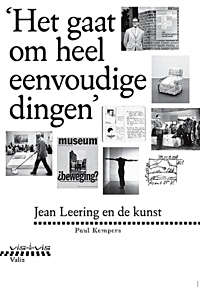 Als eerste haalde Leering kunstenaars als Robert Morris, Donald Judd, Christo, Bruce Nauman en Joseph Beuys naar Nederland. Hij organiseerde exposities over minimal art, seriële kunst en lichtkunst die internationaal de aandacht trokken.
Als eerste haalde Leering kunstenaars als Robert Morris, Donald Judd, Christo, Bruce Nauman en Joseph Beuys naar Nederland. Hij organiseerde exposities over minimal art, seriële kunst en lichtkunst die internationaal de aandacht trokken.
De bewonderde tentoonstellingmaker – opgeleid als bouwkundig ingenieur – schrok niet terug voor ferme uitspraken. Het museum? Dat was onderdeel van de preventieve geestelijke gezondheidszorg, een instrument voor emancipatie, een kritisch beeldinstituut dat kon bijdragen aan de vorming van de publieke opinie. Met geëngageerde tentoonstellingen als ‘De Straat’, ‘Cityplan Eindhoven’ en ‘Bouwen ’20-’40’ zou het van Abbe de toon zetten voor een generatie jonge curatoren in de eenentwintigste eeuw.
Leering was een activist van de geest wiens ideeën soms op felle tegenstand stuitten. Met zijn vaste vormgever Jan van Toorn zette hij vraagtekens bij de status van het museum als onbetwiste autoriteit. De vraagtekens werden uitroeptekens toen Leering ontslag nam om leiding te geven aan de nieuwe koers van het Tropenmuseum (1973-1975) in Amsterdam.
Tentoonstellingen, vond Leering, dienden inzicht te geven in hoe de wereld in elkaar stak. Hoe de wereld verkeerd in elkaar stak, soms. En wat daar aan gedaan kon worden. Want een museum dat zijn werkzaamheid alleen tot het netvlies wilde beperken, was een half museum.
Over hoe dat museum eruit had kunnen zien, gaat dit boek. Over de kijker tegenover het kunstwerk en de band tussen kunst en samenleving. Met Heidegger, Merleau-Ponty en Foucault waakzaam in de coulissen.
Biografie Jean Leering
‘Het gaat om heel eenvoudige dingen’:
Jean Leering en de kunst
Auteur: Paul Kempers
Ontwerp: Sam de Groot
Serie: vis-à-vis
2018, Valiz
paperback
336 blz.
23,5 x 16,5 cm (staand)
Nederlands
ISBN 978-94-92095-07-7
new books
fleursdumal.nl magazine
More in: - Book News, - Bookstores, Antony Kok, Archive K-L, Art & Literature News, Art Criticism, César Domela, De Stijl, Exhibition Archive, Gerrit Rietveld, Piet Mondriaan, Theo van Doesburg
_____________________________________________________________________________
August 7, 2018
NEW YORK – The unannounced demolition of Chinese artist Ai Weiwei’s studio in Beijing is symptomatic of a larger attack on human rights and artistic expression in China, said PEN America today.
On August 6, Artist and activist Ai Weiwei announced on social media that authorities had demolished his Beijing artist studio. Ai stated that he had received no advance notice prior to the demolition. Although several of his works were damaged in the studio’s demolition, the artist explained that he is more preoccupied with the effects of China’s “urban development” projects on artists and migrant populations, saying: “Since last year, a policy was enacted to clear out migrant workers from Beijing . . . Those who do not belong to the establishment, including artists, are always the first to be discriminated against and sacrificed.”
Within the past few years, artist colonies including Songzhuang and Caochangdi—the latter an arts district that Ai helped develop—have been targeted for eviction and demolition. Artists have cited both runaway economic development and political disfavor as rationales for authorities’ hostile attitudes. More broadly, an urban development policy conceived last year to push migrant workers out of Beijing has empowered local authorities to take unannounced action to demolish property, a policy that has led to thousands of migrant workers losing their homes.
“Regardless of the government’s motives, the unannounced demolition of an artist’s studio is a demonstration of a lack of appreciation or even acknowledgment for the role of the artist in society,” said Julie Trébault, Director of PEN America’s Artists at Risk Connection. “Around the world, artist studios and communes are spaces to be cherished, not discarded.”
PEN America leads the Artists at Risk Connection (ARC), a program dedicated to assisting imperiled artists and strengthening the network of organizations that support them. If you or someone you know is an artist at risk, contact ARC here.
PEN America stands at the intersection of literature and human rights to protect open expression in the United States and worldwide. They champion the freedom to write, recognizing the power of the word to transform the world. Their mission is to unite writers and their allies to celebrate creative expression and defend the liberties that make it possible.
www.pen.org
the freedom to write
fleursdumal.nl magazine
More in: Ai Weiwei, Art & Literature News, AUDIO, CINEMA, RADIO & TV, Exhibition Archive, FDM Art Gallery, MUSEUM OF PUBLIC PROTEST, REPRESSION OF WRITERS, JOURNALISTS & ARTISTS
Audio-file
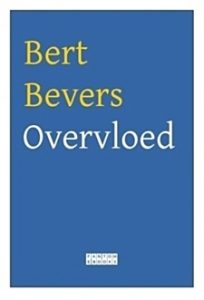 A reading of Ufarassus the Gothic translation of the poem “Overvloed” by Bert Bevers.
A reading of Ufarassus the Gothic translation of the poem “Overvloed” by Bert Bevers.
Translation by HroÞiland Bairteins, Tom De Herdt and J.G. Quak and recorded by Eric Kingsepp.
# Link to Audio-file of a reading of Ufarassus (Overvloed) by Bert Bevers
BERT BEVERS
OVERVLOED
Tien vertalingen van één gedicht
FANTOM EBOOKS
Art Brut Digital Editions
Series Fantom Ebooks
www.fleursdumal.nl
FANTOM 1
Fantom Ebook 2017
ISBN: 978-90-76326-09-2
NUR 306
1ste PDF-uitgave FANTOM, Augustus 2017
audio-file poem by Bert Bevers
fleursdumal.nl magazine
More in: #Archive A-Z Sound Poetry, - Audiobooks, Archive A-B, AUDIO, CINEMA, RADIO & TV, Overvloed
The poems of Ulrike Almut Sandig are at once simple and fantastic.
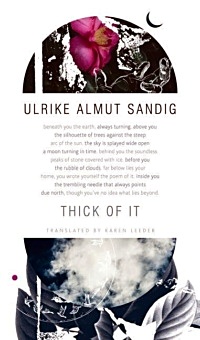 This new collection finds her on her way to imaginary territories. Thick of It charts a journey through two hemispheres to “the center of the world” and navigates a “thicket” that is at once the world, the psyche, and language itself.
This new collection finds her on her way to imaginary territories. Thick of It charts a journey through two hemispheres to “the center of the world” and navigates a “thicket” that is at once the world, the psyche, and language itself.
The poems explore an urgently urban reality, but that reality is interwoven with references to nightmares, the Bible, fairy tales, and nursery rhymes—all overlaid with a finely tuned longing for a disappearing world. The old names are forgotten, identities fall away; things disappear from the kitchen; everything is sliding away.
Powerful themes emerge, but always mapped onto the local, the fractured individual in “the thick of it” all. This is language at its most crafted and transformative, blisteringly contemporary, but with a kind of austerity, too.
By turns comic, ironic, skeptical, nostalgic, these poems are also profoundly musical, exploiting multiple meanings and stretching syntax, so that the audience is constantly kept guessing, surprised by the next turn in the line.
Titel: Thick of It
Autor: Ulrike Almut Sandig
Sprache: Englisch.
Buch (gebunden)
€ 17,49
YALE UNIVERSITY PRESS ACADEMIC
Distributed for Seagull Books
Translated by Karen Leeder
2018
96 pages
ISBN: 0857425560
EAN: 9780857425560
new poetry
fleursdumal.nl magazine
More in: - Book News, - Bookstores, Archive S-T, Archive S-T, Art & Literature News
À la fois récit et manifeste, cet essai dédié à l’ardeur poétique risque à tout propos la première personne du singulier afin de témoigner de cet éblouissement que suscite la lecture d’un poème, et combien cet éblouissement peut perdurer.
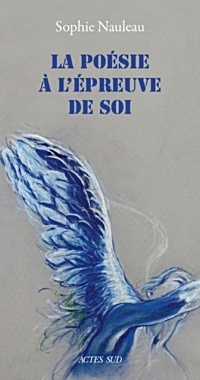 Huit brefs chapitres entraînent le lecteur sur les versants de la poésie vécue, celle qui, comme le voulait Rimbaud, change bel et bien la vie. Car il s’agit de sortir des sentiers battus où l’on veut faire croire que les poètes ne sont que des rêveurs plus ou moins solitaires. Ici l’on ose de nouveaux chemins de traverse, toutes époques et contrées confondues, jusqu’à prouver que la poésie, mise à l’épreuve de soi, a pouvoir sur les êtres et sur leur destinée.
Huit brefs chapitres entraînent le lecteur sur les versants de la poésie vécue, celle qui, comme le voulait Rimbaud, change bel et bien la vie. Car il s’agit de sortir des sentiers battus où l’on veut faire croire que les poètes ne sont que des rêveurs plus ou moins solitaires. Ici l’on ose de nouveaux chemins de traverse, toutes époques et contrées confondues, jusqu’à prouver que la poésie, mise à l’épreuve de soi, a pouvoir sur les êtres et sur leur destinée.
Ce récit, cet essai, ce manifeste, d’une tonique originalité quant à l’écriture et aux angles d’attaque, célèbre ainsi un engagement existentiel qui est la liberté même.
Présentation de l’éditeur: A la fois récit et manifeste, cet essai dédié à l’ardeur poétique risque à tout propos la première personne du singulier afin de témoigner de cet éblouissement que suscite la lecture d’un poème, et combien cet éblouissement peut perdurer. Huit brefs chapitres entraînent le lecteur sur les versants de la poésie vécue, celle qui, comme le voulait Rimbaud, change bel et bien la vie. Car il s’agit de sortir des sentiers battus où l’on veut faire croire que les poètes ne sont que des rêveurs plus ou moins solitaires. Ici l’on ose de nouveaux chemins de traverse, toutes époques et contrées confondues, jusqu’à prouver que la poésie, mise à l’épreuve de soi, a pouvoir sur les êtres et sur leur destinée.
Biographie de l’auteur: Née en 1977 à Toulouse, Sophie Nauleau est écrivain. Docteur en littérature française et diplômée de l’Ecole du Louve, elle a produit pour France Culture des documentaires et des émissions régulières. Elle a composé de nombreuses anthologies poétique, et notamment publié La Main d’oublies (Galilée), La Voie de l’écuyer (Actes Sud) et La Vie cavalière (Gallimard). Elle est désormais directrice artistique du Printemps des Poètes.
La Poésie à l’épreuve de soi
Sophie Nauleau
Éditions Actes Sud
Actes Sud Littérature
Poésie
7 Mars, 2018
Langue : Français
Poche: 80 pages
10,0 x 19,0 cm
prix indicatif : 13, 00€
ISBN-10: 2330097417
ISBN-13: 978-2330097417
new books
fleursdumal.nl magazine
More in: - Book News, - Bookstores, Archive M-N, Art & Literature News
De Uitmarkt vindt evenals vorig jaar plaats rond het Oosterdok en het Marineterrein Amsterdam. Traditiegetrouw in het laatste weekend van augustus, dit jaar van vrijdag 24 tot en met zondag 26 augustus. Gedurende deze drie dagen zijn er op zo’n 25 podia circa 300 optredens te bewonderen, met op zondagavond de populaire Musical Sing a Long als afsluiter.

De Uitmarkt vormt de start van het culturele seizoen. Het laat bezoekers proeven van het diverse culturele aanbod dat Nederland te bieden heeft. Door het succes van de afgelopen editie heeft Stichting Uitmarkt ervoor gekozen om de Uitmarkt 2018 wederom op en rond het Oosterdok te laten plaatsvinden. Met toegang tot onder andere het Scheepvaartmuseum, NEMO Science Museum en het Marineterrein Amsterdam heeft deze locatie de bezoeker veel variatie te bieden.
Meer nog dan vorig jaar, door de uitbreiding met een extra stuk terrein. Het Scheepvaartmuseum vormt opnieuw het prachtige decor van het hoofdpodium.
‘Bezoekers hebben vorig jaar enthousiast gereageerd op de nieuwe locatie. Dit in combinatie met de goede infrastructurele voorzieningen, was voor ons reden genoeg om dit gebied opnieuw in te richten voor de 41 ste editie van de Uitmarkt’, zegt Jan de Rooij, voorzitter Stichting Uitmarkt.
Bezoekers van de Uitmarkt krijgen een gratis voorproefje van wat er in het seizoen 2018-2019 in de theaters, musea en concertzalen te beleven is. Artiesten vanuit het hele land en van verschillende genres zijn aanwezig. Naast de gevestigde orde is er ook volop ruimte voor nieuwkomers. Bijvoorbeeld in de Remix Area waar urban talent uit de verschillende Amsterdamse stadsdelen zich presenteren of de jonge theatermakers op het Fringe podium.
# Meer informatie over het programma op website www.uitmarkt.nl
41ste editie van de Uitmarkt – hét startsein van het Nederlandse culturele seizoen – vindt plaats rond het Oosterdok en op het Marineterrein Amsterdam van 24 tot 26 augustus 2018.
fleursdumal.nl magazine
More in: - Book News, - Bookstores, Art & Literature News, AUDIO, CINEMA, RADIO & TV, DANCE & PERFORMANCE, Exhibition Archive, LITERARY MAGAZINES, MUSIC, STREET POETRY, THEATRE
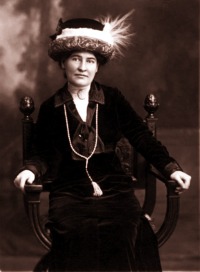
Arcadian Winter
Woe is me to tell it thee,
Winter winds in Arcady!
Scattered is thy flock and fled
From the glades where once it fed,
And the snow lies drifted white
In the bower of our delight,
Where the beech threw gracious shade
On the cheek of boy and maid:
And the bitter blasts make roar
Through the fleshless sycamore.
White enchantment holds the spring,
Where thou once wert wont to sing,
And the cold hath cut to death
Reeds melodious of thy breath.
He, the rival of thy lyre,
Nightingale with note of fire,
Sings no more; but far away,
From the windy hill-side gray,
Calls the broken note forlorn
Of an aged shepherd’s horn.
Still about the fire they tell
How it long ago befell
That a shepherd maid and lad
Met and trembled and were glad;
When the swift spring waters ran,
And the wind to boy or man
Brought the aching of his sires–
Song and love and all desires.
Ere the starry dogwoods fell
They were lovers, so they tell.
Woe is me to tell it thee,
Winter winds in Arcady!
Broken pipes and vows forgot,
Scattered flocks returning not,
Frozen brook and drifted hill,
Ashen sun and song-birds still;
Songs of summer and desire
Crooned about the winter fire;
Shepherd lads with silver hair,
Shepherd maids no longer fair.
Willa Cather
(1873-1947)
poetry
fleursdumal.nl magazine
More in: #More Poetry Archives, 4SEASONS#Winter, Archive C-D, Archive C-D
Osip Mandelstam is a central figure not only in modern Russian but in world poetry, the author of some of the most haunting and memorable poems of the twentieth century.
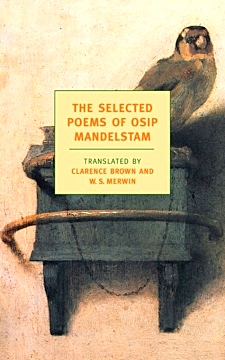 A contemporary of Anna Akhmatova, Marina Tsvetayeva, and Boris Pasternak, a touchstone for later masters such as Paul Celan and Robert Lowell, Mandelstam was a crucial instigator of the “revolution of the word” that took place in St. Petersburg, only to be crushed by the Bolshevik Revolution. Mandelstam’s last poems, written in the interval between his exile to the provinces by Stalin and his death in the Gulag, are an extraordinary testament to the endurance of art in the presence of terror.
A contemporary of Anna Akhmatova, Marina Tsvetayeva, and Boris Pasternak, a touchstone for later masters such as Paul Celan and Robert Lowell, Mandelstam was a crucial instigator of the “revolution of the word” that took place in St. Petersburg, only to be crushed by the Bolshevik Revolution. Mandelstam’s last poems, written in the interval between his exile to the provinces by Stalin and his death in the Gulag, are an extraordinary testament to the endurance of art in the presence of terror.
This book represents a collaboration between the scholar Clarence Brown and W. S. Merwin, one of contemporary America’s finest poets and translators. It also includes Mandelstam’s “Conversation on Dante,” an uncategorizable work of genius containing the poet’s deepest reflections on the nature of the poetic process.
Osip Mandelstam (1891–1938) was born and raised in St. Petersburg, where he attended the prestigious Tenishev School, before studying at the universities of St. Petersburg and Heidelberg and at the Sorbonne. Mandelstam first published his poems in Apollyon, an avant-garde magazine, in 1910, then banded together with Anna Akhmatova and Nicholas Gumilev to form the Acmeist group, which advocated an aesthetic of exact description and chiseled form, as suggested by the title of Mandelstam’s first book, Stone (1913).
During the Russian Revolution, Mandelstam left Leningrad for the Crimea and Georgia, and he settled in Moscow in 1922, where his second collection of poems, Tristia, appeared. Unpopular with the Soviet authorities, Mandelstam found it increasingly difficult to publish his poetry, though an edition of collected poems did come out in 1928. In 1934, after reading an epigram denouncing Stalin to friends, Mandelstam was arrested and sent into exile. He wrote furiously during these years, and his wife, Nadezhda, memorized his work in case his notebooks were destroyed or lost. (Nadezhda Mandelstam’s extraordinary memoirs of life with her husband, Hope Against Hope and Hope Abandoned, published in the 1970s, later helped to bring Mandelstam a worldwide audience.)
Clarence Brown is the author of a prize-winning biography of Mandelstam and is Professor Emeritus of Comparative Literature at Princeton.
W.S. Merwin was born in New York City in 1927 and grew up in Union City, New Jersey, and in Scranton, Pennsylvania. From 1949 to 1951 he worked as a tutor in France, Portugal, and Majorca. He has since lived in many parts of the world, most recently on Maui in the Hawaiian Islands. He is the author of many books of poems, prose, and translations and has received both the Pulitzer and the Bollingen Prizes for poetry, among numerous other awards.
The Selected Poems of Osip Mandelstam
by Osip Mandelstam, translated from the Russian by Clarence Brown and by W.S. Merwin
Paperback
Series: New York Review Books Classics
Pages: 192
Publ. Date: August 31, 2004
Language: English
ISBN-10: 1590170911
ISBN-13: 978-1590170915
Books That Everyone Should Read
fleursdumal.nl magazine
More in: Archive M-N, Mandelstam, Osip, REPRESSION OF WRITERS, JOURNALISTS & ARTISTS
Hij hoort stemmen. Hij kijkt om en ziet zijn dochter bij de winkel van de slager. Half in de deur, half in de winkel, staat ze te lachen. Elke dag gaat ze naar Kemp, alleen maar voor zijn praatjes en voor een onsje van dit en een stukje van dat.
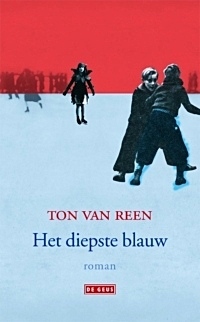 Hoe het leven gelopen is. Niet Kemp maar Mels is met Lizet getrouwd, gewoon omdat ze zwanger was na een avond vrijen. Zwanger uit balorigheid. Hij was in de val gelopen die Lizet voor hem had gezet. Ze had zijn hulp ingeroepen tegen Kemp, die haar altijd achternaliep. Na een feestavond had ze hem gevraagd om haar naar huis te brengen, om Kemp te ontmoedigen. Hij had zich laten aanhalen. De hele nacht hadden ze gevreeën, op de zolder van de watermolen, op de jutemeelzakken.
Hoe het leven gelopen is. Niet Kemp maar Mels is met Lizet getrouwd, gewoon omdat ze zwanger was na een avond vrijen. Zwanger uit balorigheid. Hij was in de val gelopen die Lizet voor hem had gezet. Ze had zijn hulp ingeroepen tegen Kemp, die haar altijd achternaliep. Na een feestavond had ze hem gevraagd om haar naar huis te brengen, om Kemp te ontmoedigen. Hij had zich laten aanhalen. De hele nacht hadden ze gevreeën, op de zolder van de watermolen, op de jutemeelzakken.
Dat zijn dochter het zo goed kan vinden met haar schoonvader Kemp ziet hij als een straf. Haar lach klinkt door de straat. Hij hoort hoe ze de weg oversteekt, terug naar huis. Haar hakken klikken op de keien. Een deur slaat dicht. Het is weer stil.
Dat uitgerekend zijn dochter trouwde met de zoon van Kemp!
Kemp zwaait naar hem. Verdomd, nu moet hij nog terugzwaaien ook.
`Jammer’, roept Kemp, zijn handen als een toeter voor de mond. `Ik kan de winkel niet sluiten voor een lezing. Ik weet trouwens net zo veel over vroeger als jij.’
Mels reageert niet. Kemp liegt. Hij is nooit zijn winkel uit geweest. De mannen van het dorp werkten in de fabriek. Allemaal. Kemp weet niet hoe het er in de fabriek aan toeging. Hij kan nooit zoveel weten als Mels, die de administratie van de fabriek heeft gedaan en de salarissen heeft betaald. Hij weet wat de vrouwen uit te geven hadden. Thuis heeft hij de hele boekhouding, waarin hij zelfs het leven na kan gaan van de eerste generatie arbeiders in de watermolen. Hij kan zich met recht de chroniqueur van het dorp noemen. Wat weet zo’n Kemp meer dan wat gepraat over de kwaliteit van het vlees? Waarover praten ze in een slagerswinkel? Vertellen die vrouwen aan Kemp alles? Over hun haar dat anders moet? Over hun kerel die hen slaat? Leggen ze hun hele ziel en zaligheid bij Kemp op het hakblok?
Misschien heeft Kemp ook een beetje gelijk. De vrouwen hebben een andere geschiedenis. De meesten werkten nooit langer dan een paar jaar in de fabriek, tot ze trouwden of zwanger werden. Kemp kent de vrouwen beter, ook al kent hij ze alleen maar uit zijn winkel. De geschiedenis van de vrouwen is een heel andere dorpsgeschiedenis. Als zij er een boek over zouden schrijven, zou de geschiedenis van de fabriek maar van ondergeschikt belang zijn.
Hij rijdt naar het café. De deur gaat open. Koen, de kastelein, gaapt naar buiten en raapt de krant van de deurmat.
`Koffie?’ roept hij naar Mels.
Binnen hangt de zoetige lucht van verschaald bier en van verse koffie. Koen heeft pas een moderne espressomachine gekocht. Koffie uit Italië. Het hele café ruikt naar Rome. Koffie zoals hij die vroeger op vakantie in Italië dronk, als hij daar kampeerde. Als Lizet en de kleine nog sliepen. Zes, zeven uur in de ochtend, zo vroeg al liep hij van de camping naar het dorp. Zalig, dat gevoel van lopen. Het knisperen van het grind onder zijn schoenen. Benen die synchroon bewogen. Sterke benen. Voeten die konden kijken en feilloos de bulten en stenen vermeden. In Italië heeft hij de vreugde van het lopen geleerd. Lopen als zintuig. In het dorpscafé hadden ze daar toen al een espressoapparaat. Zo vroeg was daar al volk. Oudere mannen die witte wijn dronken, om zeven uur in de ochtend. Jonge mannen die vier, vijf kopjes espresso achter elkaar dronken om klaarheid in hun ogen te krijgen.
Hijzelf werd dromerig van de espresso. Ochtendcognac noemde hij het. En er was muziek. Plaatjes die alleen ‘s ochtends vroeg in koffiezaken werden gedraaid. Rita Ketty, met haar stem vol heimwee. En er werden kranten gelezen, waar de inkt nog van plakte. Foto’s van vermoorde hoeren in achtertuintjes van nette mensen. Ongelukken op de autostrada. Een Fiat 600 op de kop achter de vangrail met daarnaast dode kinderen in het gras. Bloed in zwart-wit. En dáárnaast een foto van een Mariaverschijning in Palermo, in scène gezet, want Maria toonde zich alleen aan de zieneres, een oude dame met dweperige ogen die heiligheid afsmeekten. En ook de stigmata van pater Pio waren weer gaan bloeden. De wonden van Christus, de nagels in handen en voeten, de doorns van de doornenkroon. Italië was altijd heftig. Pagina één droop altijd van het bloed.
Zwevend op espressogeuren en een veel te vroeg gedronken witte wijn, ging hij terug naar de tent en bereidde het ontbijt. Ingetogen, wakker maar dromend. Vergevingsgezind. Zolang ze sliepen, hoorden ze bij hem. Zolang ze stil waren, hield hij van hun aanwezigheid. De ochtend was intiem, totdat ze wakker werden en alles weer gewoon was. Gewoon een gezin dat zich aan de regels van de dag hield. Geen tijd voor dromen. Mels, doe dit. Mels, doe dat. Zet de haringen vast, het gaat waaien. Het gas is op, net nu de aardappels bijna gaar zijn, haal vlug een nieuwe fles. Nee, geen kant-en-klare pizza’s. Denk je dat ik al die aardappels weggooi! Nog voor het avond was, verlangde hij al naar de volgende ochtend. Om te lopen.
Italië, daar kan hij nooit meer heen. Frankrijk ook niet. De fietstocht die hij naar Santiago de Compostela had willen maken, is hem afgenomen. En de reis naar China. Terwijl tegenwoordig iedereen naar China gaat. China is een gewoon vakantieland geworden. De toeristen fotograferen elkaar bij de Chinese Muur. Wat zou hij die duizenden kilometers graag gelopen hebben. Met Thija en Tijger. Aan elke steen van de Muur zit een verhaal. Dat moet je met handen en voeten voelen.
De kastelein zet hem koffie voor en poetst de koffiemachine blinkend op.
Mels nipt aan de drank en geniet.
`Het was druk bij de meelfabriek vannacht’, zegt Koen. `Ze maken er een attractie van.’
`Wat een onzin.’
`Ik heb er geen problemen mee. Goed voor de zaak als hier volk komt. Daarom heb ik de koffiemachine gekocht. Dagjesmensen willen échte koffie.’ Hij haalt de lap nog eens over de blinkende machine. `Ik ga ook souvenirs verkopen. Toeristen nemen van alles mee. Ansichtkaarten. Foto’s van de silo.’
`Die heb ik genoeg. Je hoeft maar te kiezen. Ik heb alle fotomappen bij me.’ Mels legt de tas met foto’s op de bar. `Wat denk je, komen er straks veel mensen?’
`Iedereen weet het’, zegt Koen, door een map bladerend. `Het heeft in het dorpsblad gestaan. De projector staat al klaar. Ik heb twintig stoelen klaargezet.’
`Dat zijn er te weinig.’
`Ik heb er nog achter de hand.’
`Je moet ook foto’s van de Wijer verkopen.’
`Van zo’n beek? We moeten foto’s van het dorp van vroeger hebben.’ Koen slaat het album dicht. `Die zitten hier niet in. Mensen in klederdracht, daar zijn toeristen gek op.’
`Wij liepen hier niet in klederdracht.’
`Een silo en een watermolen zijn te weinig voor toeristen. Aan de Wijer ligt nog ergens een bunker. Daar kunnen we ze naartoe sturen. En dan vertel jij ze over de oorlog. Je kunt de mensen wijsmaken wat je wilt.’
`Hier is nauwelijks iets gebeurd wat het herinneren waard is. Alleen John Wilkington.’
`Wie?’
`De Engelse piloot die tegen de silo is gevlogen. Hij heeft een paar weken bij ons op zolder gewoond. De oorlog ging langs ons heen. De meeste mensen kwamen er pas achter dat er oorlog was toen we werden bevrijd. Ze hadden wel eens Duitse soldaten gezien, maar die hebben hier alles gelaten zoals het was. De meelfabriek is altijd blijven draaien. Ook Duitsers hadden brood nodig.’
`Dat die Wilkington tegen de silo vloog en bij jullie op zolder zat, daar zit wel een verkoopbaar verhaal in’, zegt Koen. `Schrijf het eens op voor het dorpsblad.’
Ton van Reen: Het diepste blauw (066)
wordt vervolgd
fleursdumal.nl magazine
More in: - Book Stories, - Het diepste blauw, Archive Q-R, Reen, Ton van
Original, touching and much-anticipated first collection from star of the Faber New Poets scheme.
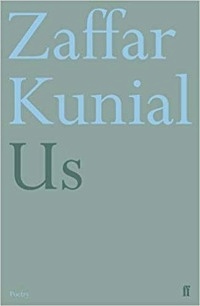
Zaffar Kunial was born in Birmingham and lives in Hebden Bridge.
He published a pamphlet in the Faber New Poets series in 2014 and spent that year as the Wordsworth Trust Poet-in-Residence.
Since his first public reading, of ‘Hill Speak’ at the 2011 National Poetry Competition awards, he has spoken at various literature festivals and in programmes for BBC radio, and won the Geoffrey Dearmer Prize for his poem ‘The Word’.
Us (Faber New Poets)
by Zaffar Kunial (Author)
Paperback
5 Jul 2018
Paperback: 64 pages
Publisher: Faber & Faber
Language: English
ISBN-10: 0571337651
ISBN-13: 978-0571337651
Dimensions: 195 x 135 x 10 mm
Publisher: Faber & Faber
new books
fleursdumal.nl magazine
More in: - Book News, Archive K-L, Archive K-L, Art & Literature News

A Death-scene
“O day! he cannot die
When thou so fair art shining!
O Sun, in such a glorious sky,
So tranquilly declining;
He cannot leave thee now,
While fresh west winds are blowing,
And all around his youthful brow
Thy cheerful light is glowing!
Edward, awake, awake–
The golden evening gleams
Warm and bright on Arden’s lake–
Arouse thee from thy dreams!
Beside thee, on my knee,
My dearest friend, I pray
That thou, to cross the eternal sea,
Wouldst yet one hour delay:
I hear its billows roar–
I see them foaming high;
But no glimpse of a further shore
Has blest my straining eye.
Believe not what they urge
Of Eden isles beyond;
Turn back, from that tempestuous surge,
To thy own native land.
It is not death, but pain
That struggles in thy breast–
Nay, rally, Edward, rouse again;
I cannot let thee rest!”
One long look, that sore reproved me
For the woe I could not bear–
One mute look of suffering moved me
To repent my useless prayer:
And, with sudden check, the heaving
Of distraction passed away;
Not a sign of further grieving
Stirred my soul that awful day.
Paled, at length, the sweet sun setting;
Sunk to peace the twilight breeze:
Summer dews fell softly, wetting
Glen, and glade, and silent trees.
Then his eyes began to weary,
Weighed beneath a mortal sleep;
And their orbs grew strangely dreary,
Clouded, even as they would weep.
But they wept not, but they changed not,
Never moved, and never closed;
Troubled still, and still they ranged not–
Wandered not, nor yet reposed!
So I knew that he was dying–
Stooped, and raised his languid head;
Felt no breath, and heard no sighing,
So I knew that he was dead.
Emily Brontë
(1818-1848)
poetry
fleursdumal.nl magazine
More in: Archive A-B, Brontë, Anne, Emily & Charlotte, In Memoriam
Thank you for reading Fleurs du Mal - magazine for art & literature